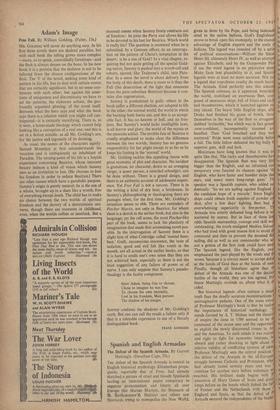Adam's Image
Free Fall. By William Golding. (Faber, 15s.)
MR. GOI.DING will never do anything easy. In his first three novels there are skeletal parables, but with each book the telling grows more complex —more, so to speak, controlledly fortuitous—and the flesh is always deeper on the bone. In his new book it is a premiss that the skeleton is not to be inferred from the chance configurations of the flesh. The 'I' of the novel, seeking some kind of pattern in his life, has to deal with certain events that are certainly significant, but in no sense con- tinuous with each other; but against his asser- tions of uniqueness and discontinuity we have to set the patterns, the elaborate echoes, the pro- foundly organised plotting, of the novel itself. Between what the hero says and what the book says there is a relation which you might call con- trapuntal—it is certainly mystifying. There is, as it were, a home-made theology which cannot help looking like a corruption of a real one; and this is set in a fiction notable, as all Mr. Golding's are, for the justice and ingenuity of its devising.
As usual, the names of the characters signify. Samuel Mountjoy at first misunderstands his vocation and is ambiguously an inhabitant of Paradise. The turning-point of his life is a boyish experience concerning Beatrice, whose innocent beauty induces a kind of vision which Sammy uses as an invitation to lust. (He chooses to lose his freedom in order to seduce Beatrice.) There are other names which have a parabolic purpose. Sammy's origin is purely natural; he is the son of a whore, brought up in a slum like a womb, free of everything except death. The child has to make no choice between the two worlds of spiritual freedom and the slavery of a deterministic uni- verse, though there are moments in childhood, even, when the worlds collide or interlock. But a moment comes when Sammy freely contracts out of freedom: he joins the Party and allows his life to be devoted to his lust for Beatrice. Which world is really his? The question is answered when he is submitted, by a German officer, to an interroga- tion on the pattern of Christ's temptation in the desert: is he a son of God? In a vital chapter, re- quiring but not quite getting all the special Gold- ing terror, Sammy is pushed into a womb-cell and reborn, ejected, like Traherne's child, into Para- dise. In a sense the novel is about delivery from the body of this death; there is more to it than the Fall (the desecration of the light that emanates from the pure suburban Beatrice) because it con- tains also regeneration.
Sammy is predestined to guilt; others in the book suffer a different election, are adapted to life in the other, the normal world, the world in which the burning bush burns out, and this is an accept- able fact. It has no heaven or hell, and no free- dom. But Sammy's world lacks intelligible laws, is all horror and glory, the world of the mystic or the mescalin addict. The terrible fate of Beatrice is cruelly emphasised to make clear the difference between the two worlds; Sammy has no genuine responsibility for her plight except in so far as he keeps his footing in the 'normal' world.
Mr. Golding tackles this appalling theme with great economy of plot and character. No incident is gratuitous, no character, down to an avenging verger, a queer parson, a retarded schoolgirl, can be done without. There is a grand design, and there is an authentic account of adolescent experi- ence. Yet Free Fall is not a success. There is in the writing a kind of dry heat, a brittleness. In Sammy's philosophising or theologising there are passages when, for the first time, Mr. Golding's invention seems to ebb. There are reminders of Pincher Martin, not only in Beatrice, for whom there is a sketch in the earlier book, but also in the language; yet the cell scene, the most Pincher-like part of the book, seems to lack the plasticity of imagination that made that astonishing novel pos- sible. In the interrogation of Sammy there is a slight hint of what Coleridge called 'mental bom- bast.' Guilt, unconscious innocence, the taste of isolation, good and evil felt like vomit in the mouth, are all actual in the earlier books, so that it is hard to credit one's own sense that they are not achieved here, especially as there is not the least suggestion of any failure of power or of nerve. I can only suppose that Sammy's pseudo- theology is the faulty component.
Since Adam, being free to choose, Chose to imagine he was free To choose his own necessity, Lost in his freedom, Man pursues The shadow of his images. . . .
Sammy confuses the shadows of Mr. Golding's myth. But one can call the result a failure only if that is a tolerable expression to use of a fiercely distinguished book.
FRANK K ERMODE






































 Previous page
Previous page